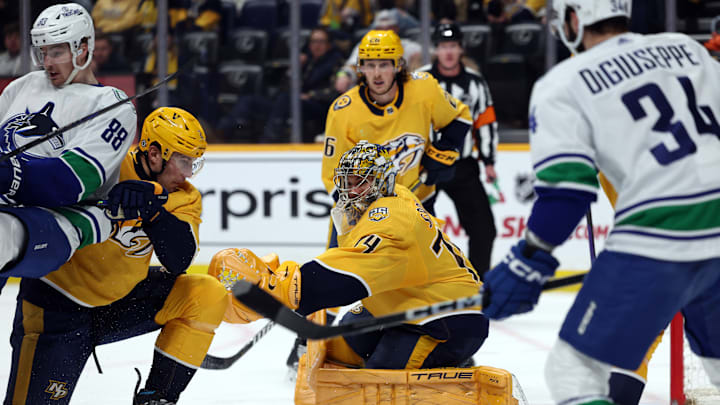The Stanley Cup playoffs are always a time when the physicality of hockey amps up noticeably. The officials take the whistles and hope they don't have to blow them. Fans will see an especially hard hitting series between the Nashville Predators and the Vancouver Canucks, who are both in the top five of hits this season as teams.
The Predators and Canucks have been remarkably even this season, with their totals coming in at 2153 and 2147 hits respectively this season. The Predators boast the NHL's single-season hit king in Jeremy Lauzon, but you can make a case for the Canucks being just as, if not more physical.
See if you want to get technical, you should minus 200 hits from the Predators total, since they went with Yakov Trenin to the Colorado Avalanche. Even without him though, the Predators have seven players who threw hits that pushed the counters into the triple digits. The Cauncks had 9, and had a player (Teddy Bluger) who had 96 hits. This won't be a series where the Predators are going to be able to bully their opponent. That also applies to the Canucks star players.
Elias Petterson, one of the most visible stars on the Canucks threw 125 hits to pair nicely with his 89 points. He's not going to be too shaken up taking some hits. Same for their leading scorer. JT Miller put up 103 points and had 217 hits to his credit. He's going to give the Predators defense some hell and won't be a shrinking violet when it comes to handling himself.
Where the Predators have two incredibly physical defenscemen in Jeremy Lauzon and Luke Schenn. The moderately physical defenders of the Canucks are Tyler Myers, Filip Hronek, Noah Juulsen and Nikita Zadorov. Everyone else gets by without needing to hit all that much. The forward groups can both handle their business. but you could make the case that the Canucks might have a more physical set of forwards.
You can also expect that the Canucks are going to play tight-checking games on the Predators top line of Filip Forsberg, Gustav Nyquist, and Ryan O'Reilly. Conversely, the Predators are likely to target Quinn Hughes with the brunt of their physicality. The 5'10' defender put up 92 points this season, and the message from Brunette and co behind the bench will likely be that he needs to feel a body every time he touches the puck.
Playoff physicality is not about dealing damage and hurting people. In the playoffs, just like in the regular season, you are taking away time and space. You are also looking to take a player's level of comfort on the ice. In a regular season game you may play with some caution, and give certain players space to force a shot rather than passes. In the playoffs, you want to take away the creativity of the elite player. If they are forced to push the puck up the boards because they have no time thanks to the opponent screaming down the boards to hit them, that is a win.
Whatever happens, the series is going to be one where physicality is at a premium, and pretty plays will come far less often than the regular season. It is going to be awesome.
